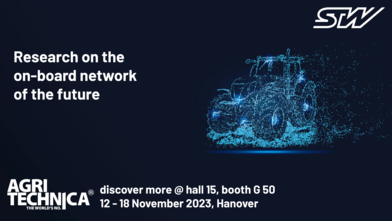What could the automotive wiring system of the future look like - and how could the development process be made safe and automated? What consequences will this have for the development of mobile machinery in the future? STW is participating in the MANNHEIM-KI4BoardNet research project to build up the knowledge needed to answer these questions now.
Around twenty partners from research and industry are involved in the MANNHEIM-KI4BoardNet research project, which is funded by the BMBF. They are designing novel processes for efficient board network development. In particular, the integration of artificial intelligence (AI) into the vehicle electrical system and its development process is to be analyzed and implemented. The system designed in the research project is far more than a classic wiring harness. It masters the growing challenges in terms of digitalization and networking within the vehicle architecture by monitoring individual zones (for example, a fender) with its own environment sensors and zone controllers. The vehicle electrical system itself becomes an intelligent component.
But what methods, electronic and software components, and chips are needed for these complex wiring system architectures? How can these extensive data streams be transferred to the machine without compromising functional safety? How do we ensure correspondingly low latencies? What standards are needed? And what contribution can AI make to this? The project partners in the MANNHEIM-KI4BoardNet research project are answering these questions.
STW is contributing its expertise as a system and electronics specialist for mobile work processes. As experts in functional safety, STW is particularly interested in the question of the conformity of AI algorithms with existing and future functional safety requirements for its own development work. The system developed in the project should be able to handle AI-based secure object recognition as well as adapt to changing connectivity requirements. STW is participating in these findings and transferring the knowledge gained from the automotive context to the development of future-proof concepts for use in mobile working machines in order to further develop the modular STW system kit. Application areas include smart sensors and sensor fusion for object recognition and identification to support fully automated systems as well as scalable communication within the vehicle.
You can find out more about our research projects and Future-Tech topics in November at Agritechnica at our booth G50 in hall 15.
